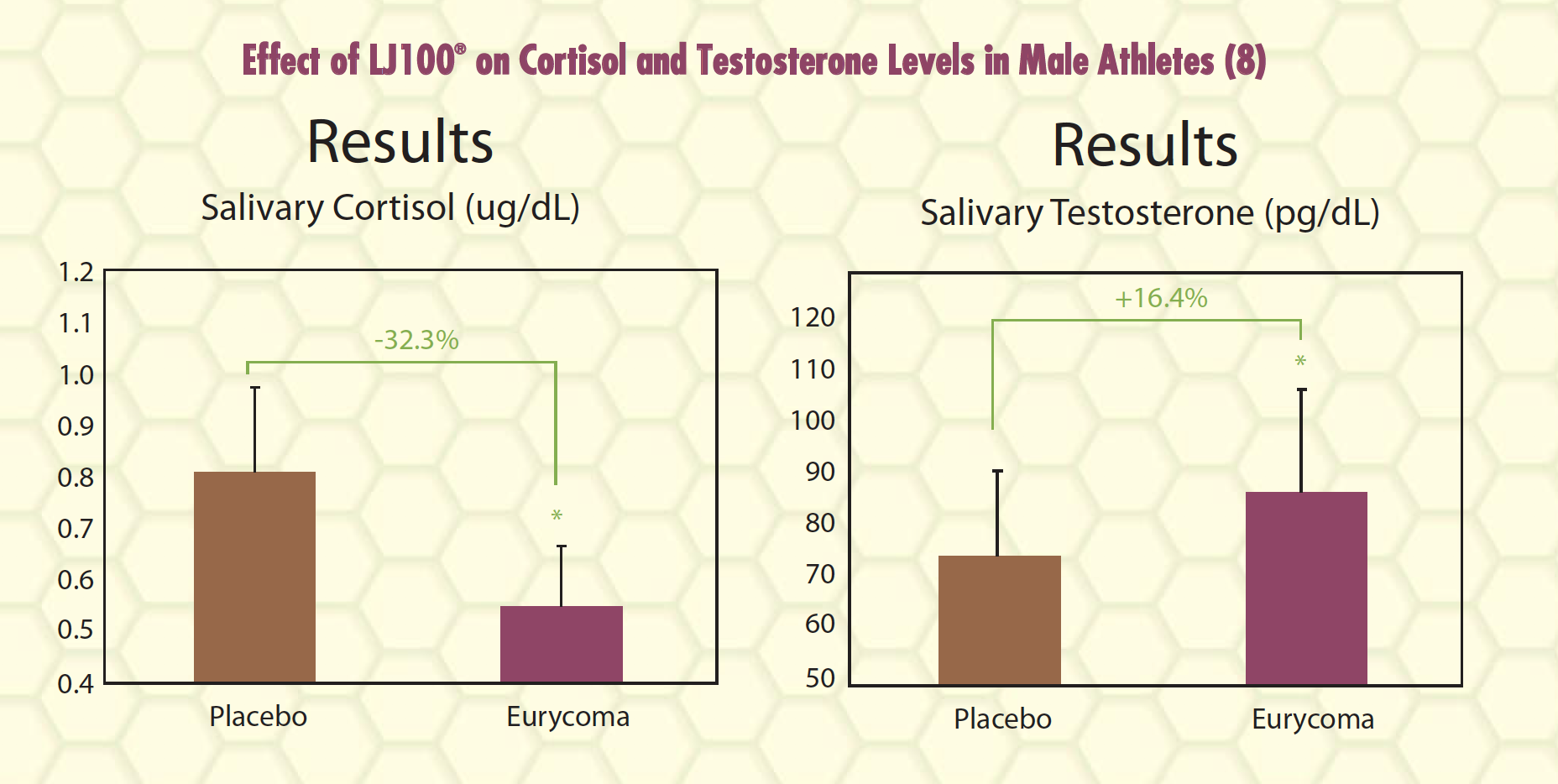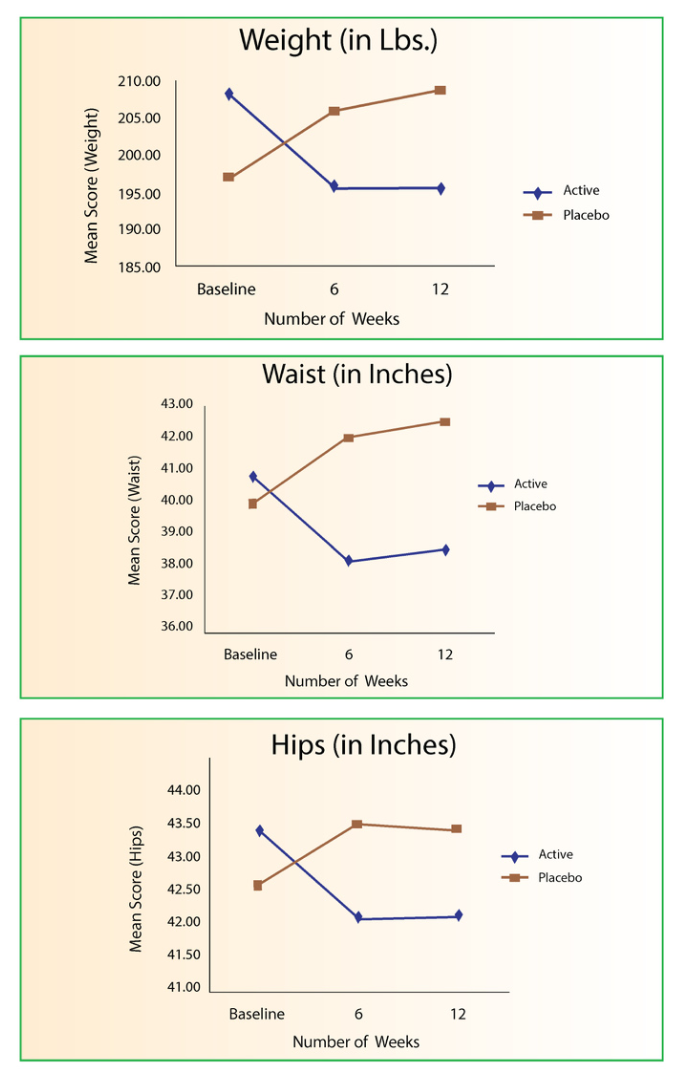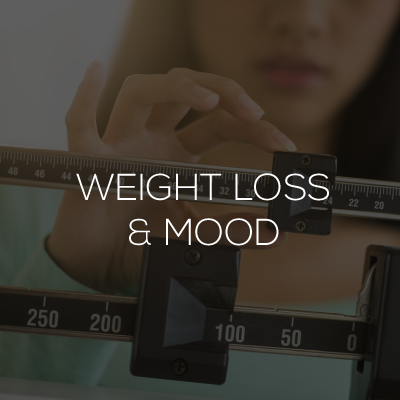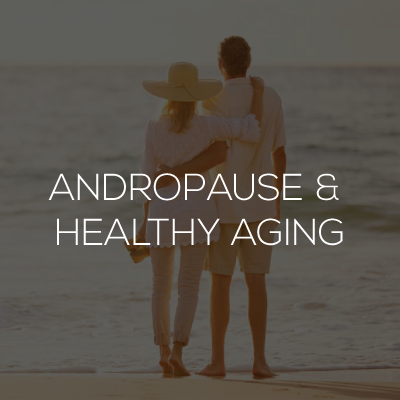WEIGHT LOSS + MOOD
Weight loss, cortisol, mood and
Energy in Men and Women
Stress & Mood Study 1
Effect of Tongkat Ali on stress hormones and psychological mood state in moderately stressed subjects; Shawn M Talbott1, Julie A Talbott, Annie George and Mike Pugh
Background: Eurycoma longifolia is a medicinal plant commonly called tongkat ali (TA) and “Malaysian ginseng.” TA roots are a traditional “anti-aging” remedy and modern supplements are intended to improve libido, energy, sports performance and weight loss. Previous studies have shown properly-standardized TA to stimulate release of free testosterone, improve sex drive, reduce fatigue, and improve well-being.
Methods: We assessed stress hormones and mood state in 63 subjects (32 men and 31 women) screened for moderate stress and supplemented with a standardized hot-water extract of TA root (TA) or Placebo (PL) for 4 weeks. Analysis of variance (ANOVA) with significance set at p < 0.05 was used to determine differences between groups.
Results: Significant improvements were found in the TA group for Tension (−11%), Anger (−12%), and Confusion (−15%). Stress hormone profile (salivary cortisol and testosterone) was significantly improved by TA supplementation, with reduced cortisol exposure (−16%) and increased testosterone status (+37%).
Conclusion: These results indicate that daily supplementation with tongkat ali root extract improves stress hormone profile and certain mood state parameters, suggesting that this “ancient” remedy may be an effective approach to shielding the body from the detrimental effects of “modern” chronic stress, which may include general day-to-day stress, as well as the stress of dieting, sleep deprivation, and exercise training.
Cortisol
Like triplets, weight status, mood and energy are strongly intertwined. When an individual begins to lose weight via healthy diet and exercise, almost like magic, his or her mood improves as does energy.
However, aging tends to cause weight gain, notably around the belly/trunk, and attempts to lose weight are often fraught with frustration, as the weight and belly fat tend to stick around. In tandem, energy and mood are also affected.
Declining circulating testosterone is a culprit, as are high levels of circulating cortisol, a stress-response hormone. Cortisol is necessary for a fight-or-flight reaction; however, modern lifestyles tend to create a chronic, low-grade stress that releases cortisol, which increases appetite. In other words, stress eating. Additionally, this status creates the tendency to store visceral fat around the trunk. Visceral fat, located deeper within the abdomen, is linked to cardiovascular disease and type-2 diabetes.
It is generally suggested that stress-induced cortisol weight is usually gained around the waistline because fat cells in that area are more sensitive to cortisol. The fat cells in your abdomen are richer in stress hormone receptors, are particularly sensitive to high insulin, and are very effective at storing energy – more so than fat cells you would find in other areas of the body. This is the most dangerous place to gain weight, as it can lead to metabolic syndrome, diabetes and heart disease.
As mentioned earlier, when one begins to lose weight, there is an upcycle, wherein energy improves as does mood. The saying, “a body in motion tends to stay in motion, while a body at rest tends to stay at rest” is relevant here: when one begins to exercise and keeps at it, energy is better sustained, and overall physical activity is increased as fat burns and muscles gain mass and strength.
In a placebo-controlled endurance study, 30 men were recruited from a 24-hour mountain biking event, given either 100 mg LJ100® or placebo. At the end of the study, cortisol levels were 32.3% lower
in the LJ100® group compared to placebo, and testosterone levels were 16.4% higher in the LJ100® group compared to placebo.
Clinical Study
In one 2007 study, 50 moderately overweight men and women were recruited to participate in a six-week program of stress management, nutrition intervention and exercise; 40 were given 50 mg of LJ100® combined with citrus bioflavanoids (CitruSlim™ provided by HP Ingredients), while 10 were given a placebo (18). The results were as follows:
- The LJ100® group showed significant body weight loss—2.7 kg with 87% body fat loss—versus 0.78 kg in body weight loss in the placebo group.
- The cortisol/testosterone ratio decreased significantly by 15% for the LJ100® group versus a 7% increase in the placebo group, suggesting that LJ100® may help promote a favorable anabolic state.
- The LJ100® group showed significant reduction of total cholesterol by 17% and LDL by 15%; there was no change in the placebo group.
- The LJ100® group showed improvement in global mood profile (19).
These results suggest that supplementation with LJ100® may help to maintain normal levels of cortisol (low) and testosterone (high) and thus promote an overall “anabolic” hormonal state (versus a “catabolic” state characterized by elevated cortisol and suppressed testosterone). In addition, the higher testosterone level also contributes to higher energy levels and reduced fatigue, and prevents dieters from binge eating.
In a study published in the Journal of the International Society of Sports Nutrition (2013), 32 men and 31 women with moderate stress levels took either 200 mg of LJ100® per day or a placebo for four weeks (20). The LJ100® group showed significant improvements in tension (−11%), anger (−12%) and confusion (−15%) compared to placebo. Stress hormone profile (salivary cortisol and testosterone) was significantly improved by LJ100®, with reduced cortisol (−16%) and increased testosterone (+37%). The authors concluded that LJ100® appears to have significant potential for restoring hormone balance (cortisol/testosterone) and improving psychological mood state in humans exposed to various modern stressors, including aging, dieting and exercise stress.
Weight Management
Switching gears to healthy weight management, in a 2014 study, 26 men ages 40–65 took 200 mg day of LJ100® (n=12) or a placebo (n=14) for 12 weeks (3). The supplemented men experienced numerous sexual health benefits (see pages 8–9), and they also experienced noteworthy benefits related to healthy weight management. While the men in the placebo group gained weight over the course of the study, the LJ100® group lost weight. In addition, hip and waist measurements were lower at the end of the study with the active group.
Stress & Mood Study 2
Weight, mood and energy are strongly intertwined. When an individual begins to lose weight through healthy diet and exercise, almost like magic, both mood
and energy tend to improve as well. However, aging tends to cause weight gain, notably around the belly/trunk, and attempts to lose weight are often fraught with frustration, as the weight and belly fat tend to stick around. In tandem, energy and mood are also affected.
Declining circulating testosterone is a culprit, as are high levels of circulating cortisol, a stress-response hormone. Cortisol is necessary for a fight-or-flight reaction; however, modern lifestyles tend to create a chronic, low-grade stress that releases cortisol, which increases appetite. In other words, stress eating. Additionally, this status creates the tendency to store visceral fat around the trunk. Visceral fat, located deeper within the abdomen, is linked to cardiovascular disease and type-2 diabetes. It is generally suggested that stress-induced cortisol weight is usually gained around the waistline because
fat cells in that area are more sensitive to cortisol. The fat cells in your abdomen are richer in stress hormone receptors, are particularly sensitive to high insulin, and are very effective at storing energy – more so than fat cells you would find in other areas of the body. This is the most dangerous place to gain weight, as it can lead to metabolic syndrome, diabetes and heart disease.
As mentioned earlier, when one begins to lose weight, there is an upcycle, wherein energy improves as does mood. Newton’s First Law of Motion states “a body in motion tends to stay in motion, while a body at rest tends to stay at rest” is relevant here: when one begins to exercise and keeps at it, energy is better sustained, and overall physical activity is increased as fat burns and muscles gain mass and strength.
In one 2007 study, 50 moderately overweight men and women were recruited to participate in a six-week program of stress management, nutrition intervention and exercise; 40 were given 50 mg of LJ100® combined with citrus bioflavanoids (CitruSlim™ provided by HP Ingredients), while 10 were given a placebo. The results were as follows:
- The LJ100® group showed significant body
weight loss—2.7 kg with 87% body fat loss—versus
0.78 kg in body weight loss in the placebo group. - The cortisol/testosterone ratio decreased
significantly by 15% for the LJ100® group versus
a 7% increase in the placebo group, suggesting
that LJ100® may help promote a favorable
anabolic state. - The LJ100® group showed significant reduction
of total cholesterol by 17% and LDL by 15%;
there was no change in the placebo group. - The LJ100® group showed improvement in
global mood profile
These results suggest that supplementation with LJ100® may help to maintain normal levels of cortisol (low) and testosterone (high) and thus promote an overall “anabolic” hormonal state (versus a “catabolic” state characterized by elevated cortisol and suppressed testosterone). In addition, the higher testosterone level also contributes to higher energy levels and reduced fatigue, and prevents dieters from binge eating.






